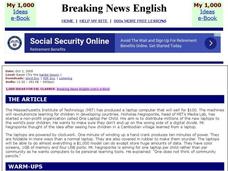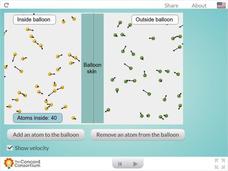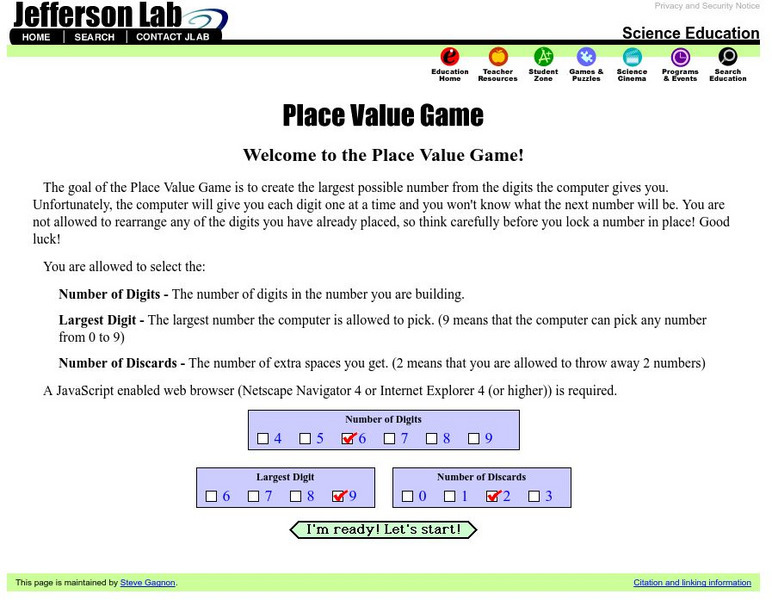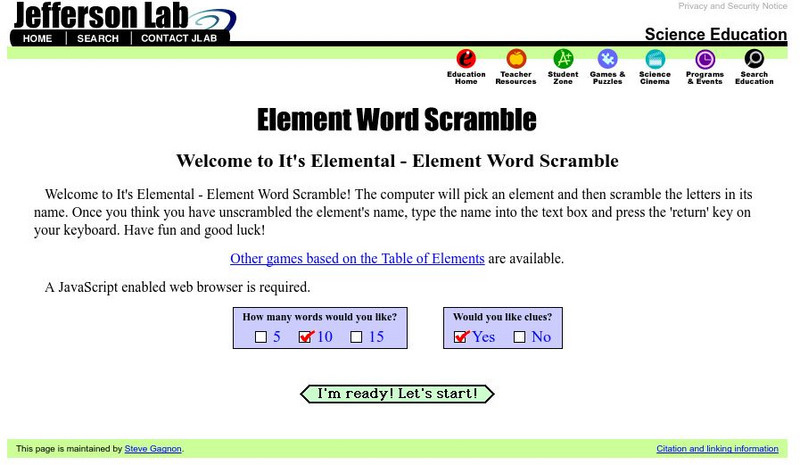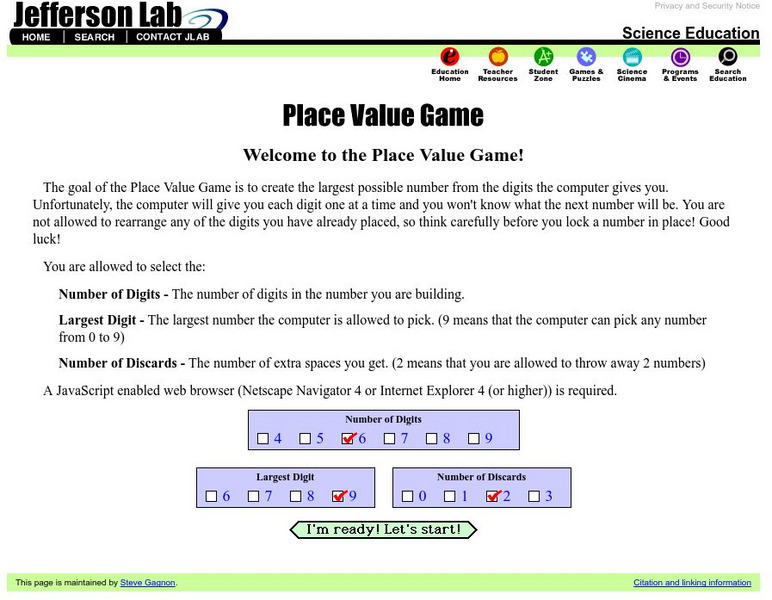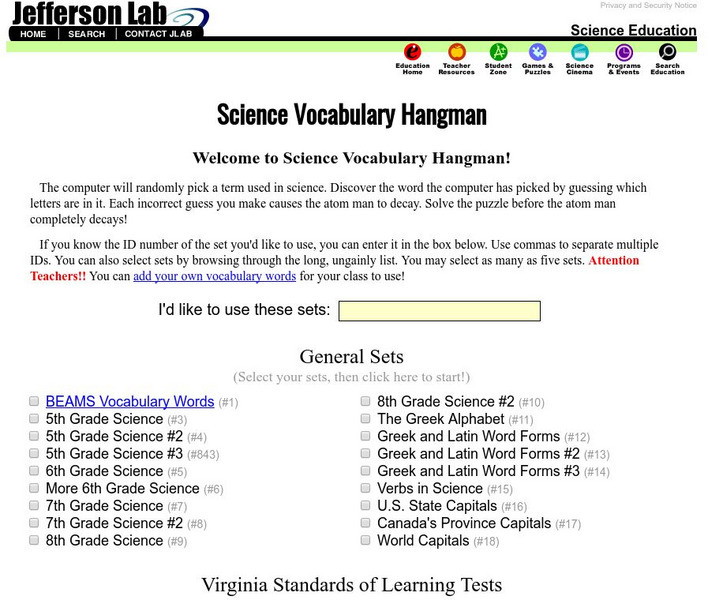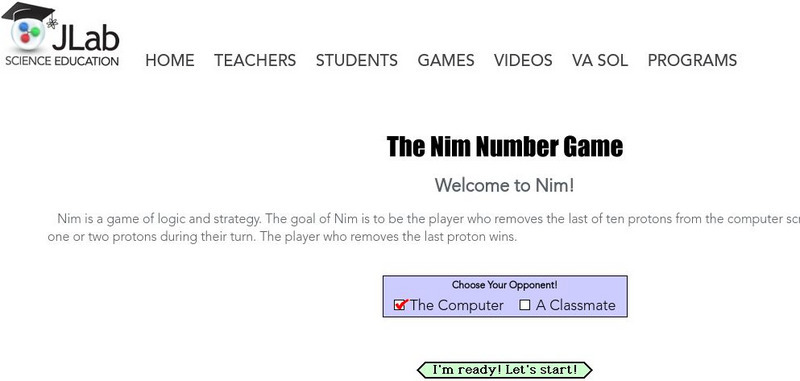Curated OER
Breaking News English: One Hundred Dollar Laptop Computer
In this one hundred dollar laptop computer worksheet, learners read the article, answer true and false questions, complete synonym matching, complete phrase matching, complete a gap fill, answer short answer questions, answer discussion...
Curated OER
pH Lab
In this pH worksheet, students experiment with dilutions of acidic solutions to test for the pH using cabbage as an indicator. They then test a variety of substances for pH. On day two of the lab, they test conductivity of solutions and...
Magic of Physics
Unit Converter I
Talk about a cool tool! Convert between units with the click of a mouse using a handy online resource. Enter the starting measurement and units for quantities such as torque, speed, and inertia, then sit back and relax while the computer...
Concord Consortium
What Is Pressure?
Balloons bring great fun to the classroom, until they break. What's a teacher to do then? Break out the balloon of the computer age with a fun interactive! Science scholars add and remove atoms from their virtual balloons and observe...
Curated OER
Igneous Rock Lab
In this igneous rock worksheet, students answer 5 questions about igneous rocks and then use a website to find the 6 textures of igneous rock. Students record data such as the color, the texture, if it's intrusive or extrusive, if its...
Concord Consortium
Diffusion Across a Semipermeable Membrane
Semipermeable membranes allow water to go through—but not larger molecules. The simulation encourages pupils to adjust the membrane pore size to understand how this works. It also provides a way to trace the movement of a single molecule.
Concord Consortium
Modeling Transcription
Transcription makes copies of the instructions inside all living things. Scholars use the simulation to separate DNA and transcribe the RNA. They see a demonstration of the nucleotide pairings as well as the start and stop instructions.
Curated OER
MYSPACE Profiles - Romeo and Juliet Characterization
In this Romeo and Juliet worksheet, students create a MySpace website as a characterization analysis for the play Romeo and Juliet. Students complete a characterization sheet for the activity.
Thomas Jefferson National Accelerator Facility
Jefferson Lab: Place Value Game
This interactive math game lets you create the largest number possible as the computer gives you numbers.
Thomas Jefferson National Accelerator Facility
Jefferson Lab: Balancing Act!
The computer will give you a number of incomplete chemical equations. Balance the chemical equations by selecting coefficients from the pull-down menus. Once you think the equation is balanced, press the 'Check my answer!' button.
Thomas Jefferson National Accelerator Facility
Jefferson Lab: Element Word Scramble
The computer will pick an element and then scramble the letters in its name. Once you think you have unscrambled the element's name, type the name into the text box and press the 'return' key on your keyboard. A clue is included to help...
Thomas Jefferson National Accelerator Facility
Jefferson Lab: Element Matching Game
The computer will give you a list of chemical symbols and a list of chemical names. Choose the chemical name that each chemical symbol represents. Press the 'Check my answers!' button after you have made your choices.
Thomas Jefferson National Accelerator Facility
Jefferson Lab: Place Value Game
The goal of the Place Value Game is to create the largest possible number from the digits the computer gives you. Unfortunately, the computer will give you each digit one at a time and you won't know what the next number will be. You are...
Thomas Jefferson National Accelerator Facility
Jefferson Lab: Element Hangman
How well do you know your elements? The computer will randomly pick the name of one of the elements. Use the clue to discover which element the computer picked. Be careful! Each incorrect letter you guess causes the atom man to decay.
Thomas Jefferson National Accelerator Facility
Jefferson Lab: Element Concentration
The computer will display a number of cards with the names and symbols of the elements. After you have had time to study the cards, the computer will flip them over and ask you to find a particular element. Click on the card that...
Thomas Jefferson National Accelerator Facility
Jefferson Lab: Science Vocabulary Hangman
Use the science clues to discover the computer's secret word!
Thomas Jefferson National Accelerator Facility
Jefferson Lab: Mystery Math
Amaze your friends with this number trick! Mystery Math is a number game that allows you to guess another person's secret number. If you want to play Mystery Math with the computer, you will need a pencil, a piece of paper and a...
Thomas Jefferson National Accelerator Facility
Jefferson Lab: Speed Math Deluxe
The goal of SpeedMath Deluxe is to create an equation, as quickly as possible, from the four digits the computer gives you. You can use addition, subtraction, multiplication and division to create your equation, but you are not allowed...
Thomas Jefferson National Accelerator Facility
Jefferson Lab: The Nim Number Game
Students can play a game against the computer to see who gets the most protons.
Thomas Jefferson National Accelerator Facility
Jefferson Lab: Elemental Balancing Act!
Welcome to It's Elemental - Balancing Act! The computer will give you a number of incomplete chemical equations. Balance the chemical equations by selecting coefficients from the pull-down menus. Once you think the equation is balanced,...
Concord Consortium
Concord Consortium: Stem Resources: Confliction Selection Pressures
Investigate how selection pressures and natural selection influence populations growth with this computer model. Understand how a population changes when selection pressures are in conflict. Perform the virtual lab to see what happens to...
Concord Consortium
Concord Consortium: Stem Resources: Meiosis
Why don't you look exactly like your brother or sister? Meiosis involves the reducing of genetic material and chromosome shuffling which results in different genetic combinations. In this activity, students will view a computer model of...
Concord Consortium
Concord Consortium: Stem Resources: How Loud, How High?
What are ways to describe sound? Using the program downloaded called Sound Grapher and the microphone on the computer, students can investigate the frequency, wavelength, amplitude, and velocity of sound waves. Activity includes detailed...
University of Colorado
University of Colorado: Ph Et Interactive Simulations: Acid Base Solutions
How do strong and weak acids differ? Use lab tools on your computer to find out! Dip the paper or the probe into solution to measure the pH, or put in the electrodes to measure the conductivity. Then see how concentration and strength...
